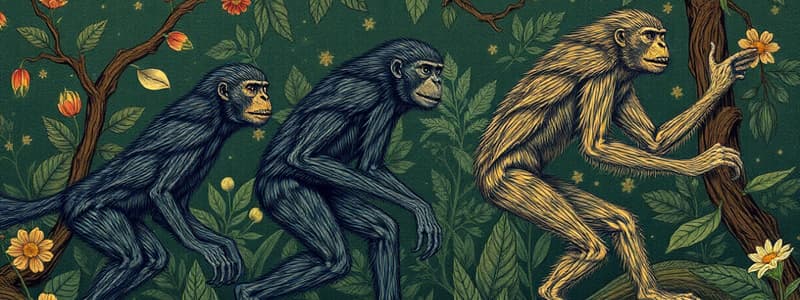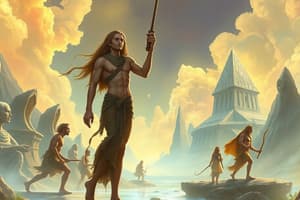Podcast
Questions and Answers
Which of the following is NOT a human ancestor prior to ape man?
Which of the following is NOT a human ancestor prior to ape man?
- Ramapithecus
- Australopithecus (correct)
- Proconsul
- Dryopithecus
What is the scientific name of the 'Java man' and 'Peking man'?
What is the scientific name of the 'Java man' and 'Peking man'?
- Homo sapiens neanderthalensis
- Homo sapiens fossilis
- Homo habilis
- Homo erectus (correct)
Which of the following is the most recent ancestor of modern humans?
Which of the following is the most recent ancestor of modern humans?
- Homo habilis
- Homo erectus
- Neanderthal man (correct)
- Australopithecus
Which of the following is NOT a true human ancestor, as defined in the text?
Which of the following is NOT a true human ancestor, as defined in the text?
What is the scientific classification of the 'Proconsul'?
What is the scientific classification of the 'Proconsul'?
Based on the provided evolutionary tree, which primate is most closely related to modern humans?
Based on the provided evolutionary tree, which primate is most closely related to modern humans?
What is the scientific name of 'Cro-magnon man'?
What is the scientific name of 'Cro-magnon man'?
Who discovered a significant amount of Proconsul fossils in Lake Victoria?
Who discovered a significant amount of Proconsul fossils in Lake Victoria?
Which of the following is NOT considered a true human ancestor?
Which of the following is NOT considered a true human ancestor?
What is the estimated age of Homo habilis remains found in Tanzania, Ethiopia and Kenya?
What is the estimated age of Homo habilis remains found in Tanzania, Ethiopia and Kenya?
What is the approximate cranial capacity of Homo habilis?
What is the approximate cranial capacity of Homo habilis?
Which of the following is NOT a feature associated with Homo habilis?
Which of the following is NOT a feature associated with Homo habilis?
What is the scientific name for Neanderthal man?
What is the scientific name for Neanderthal man?
Which of the following is another name for Homo erectus?
Which of the following is another name for Homo erectus?
What is the name of the ape-like ancestor of humans that was classified as Australopithecus?
What is the name of the ape-like ancestor of humans that was classified as Australopithecus?
Which human ancestor is known as the 'handy man' due to their use of stone tools?
Which human ancestor is known as the 'handy man' due to their use of stone tools?
Which of these characteristics is NOT mentioned in the text as a feature of Homo Sapiens?
Which of these characteristics is NOT mentioned in the text as a feature of Homo Sapiens?
Based on the given information, Homo sapiens is characterized by a cranial capacity of approximately:
Based on the given information, Homo sapiens is characterized by a cranial capacity of approximately:
The text mentions the term 'sapiens fossilis'. What is this term referring to?
The text mentions the term 'sapiens fossilis'. What is this term referring to?
The text suggests that different hominid species, such as Homo erectus, Homo neanderthalensis, and Homo sapiens, have undergone:
The text suggests that different hominid species, such as Homo erectus, Homo neanderthalensis, and Homo sapiens, have undergone:
Based on the provided content, what is the main takeaway regarding the evolutionary trend of hominids?
Based on the provided content, what is the main takeaway regarding the evolutionary trend of hominids?
What is the cranial capacity of Homo heidelbergensis?
What is the cranial capacity of Homo heidelbergensis?
What are the estimated height ranges for Neanderthals?
What are the estimated height ranges for Neanderthals?
Which of the following families includes Gibbons?
Which of the following families includes Gibbons?
What distinguishes New World monkeys from Old World monkeys in terms of infra-order classification?
What distinguishes New World monkeys from Old World monkeys in terms of infra-order classification?
Which species is believed to have evolved into Neanderthals?
Which species is believed to have evolved into Neanderthals?
What significant behavioral trait is attributed to Neanderthals?
What significant behavioral trait is attributed to Neanderthals?
Which of the following primates is not classified as a New World monkey?
Which of the following primates is not classified as a New World monkey?
Which superfamily do human beings belong to?
Which superfamily do human beings belong to?
What factor is NOT considered a cause for the extinction of Neanderthals?
What factor is NOT considered a cause for the extinction of Neanderthals?
Which family includes gorillas and chimpanzees?
Which family includes gorillas and chimpanzees?
What is the cranial capacity of Neanderthals?
What is the cranial capacity of Neanderthals?
How tall was Homo heidelbergensis estimated to be?
How tall was Homo heidelbergensis estimated to be?
In the order Primates, which infra-order includes the spider monkey?
In the order Primates, which infra-order includes the spider monkey?
Which statement is correct regarding Neanderthal burial practices?
Which statement is correct regarding Neanderthal burial practices?
Which of the following describes the relationship between Hominoidea and Hominidae?
Which of the following describes the relationship between Hominoidea and Hominidae?
Which of the following is not a characteristic of the infra-order Catarrhini?
Which of the following is not a characteristic of the infra-order Catarrhini?
What book did T.H. Huxley write in 1863 AD to explain the origin and evolution of man?
What book did T.H. Huxley write in 1863 AD to explain the origin and evolution of man?
Which of the following is NOT a characteristic of anthropology?
Which of the following is NOT a characteristic of anthropology?
Flashcards
What is anthropology?
What is anthropology?
The study of humans, early hominids, and primates, like chimpanzees, to understand human origins and evolution.
What is an anthropologist?
What is an anthropologist?
A person who studies human biology, culture, and evolution to understand our origins and social practices.
What is 'Man's Place in Nature'?
What is 'Man's Place in Nature'?
The first attempt to scientifically explain human origins and evolution, published in 1863.
What is 'The Descent of Man'?
What is 'The Descent of Man'?
Signup and view all the flashcards
What is the key difference between New World and Old World monkeys?
What is the key difference between New World and Old World monkeys?
Signup and view all the flashcards
Where are New World and Old World monkeys located?
Where are New World and Old World monkeys located?
Signup and view all the flashcards
What is the definition of 'cultural anthropology' ?
What is the definition of 'cultural anthropology' ?
Signup and view all the flashcards
What is 'biological anthropology'?
What is 'biological anthropology'?
Signup and view all the flashcards
Primates
Primates
Signup and view all the flashcards
Anthropoidea
Anthropoidea
Signup and view all the flashcards
Catarrhini
Catarrhini
Signup and view all the flashcards
Platyrrhini
Platyrrhini
Signup and view all the flashcards
Cercopithecoidea
Cercopithecoidea
Signup and view all the flashcards
Hominoidea
Hominoidea
Signup and view all the flashcards
Hominidae
Hominidae
Signup and view all the flashcards
Pongidae
Pongidae
Signup and view all the flashcards
Proconsul
Proconsul
Signup and view all the flashcards
Dryopithecus
Dryopithecus
Signup and view all the flashcards
Ramapithecus
Ramapithecus
Signup and view all the flashcards
Shivapithecus
Shivapithecus
Signup and view all the flashcards
Australopithecus
Australopithecus
Signup and view all the flashcards
Australopithecus afarensis
Australopithecus afarensis
Signup and view all the flashcards
Australopithecus robustus
Australopithecus robustus
Signup and view all the flashcards
Homo habilis
Homo habilis
Signup and view all the flashcards
Neanderthals
Neanderthals
Signup and view all the flashcards
Evolutionary Trend
Evolutionary Trend
Signup and view all the flashcards
Modern Humans
Modern Humans
Signup and view all the flashcards
Homo Erectus
Homo Erectus
Signup and view all the flashcards
Homo Heidelbergensis
Homo Heidelbergensis
Signup and view all the flashcards
Cranial Capacity
Cranial Capacity
Signup and view all the flashcards
Chronospecies
Chronospecies
Signup and view all the flashcards
Evolution
Evolution
Signup and view all the flashcards
Tool Use
Tool Use
Signup and view all the flashcards
Burial Practices
Burial Practices
Signup and view all the flashcards
Extinction
Extinction
Signup and view all the flashcards
Human Ancestors
Human Ancestors
Signup and view all the flashcards
Neanderthal man
Neanderthal man
Signup and view all the flashcards
Cro-magnon man
Cro-magnon man
Signup and view all the flashcards
Evolutionary Biology
Evolutionary Biology
Signup and view all the flashcards
Study Notes
Evolutionary Biology: Origin and Evolution of Man
-
Human evolution is studied through anthropology, focusing on human societies, cultures, biological and physiological characteristics, and their evolution.
-
An anthropologist studies elements of humans, including biology and culture, to understand human origins and the development of beliefs and social customs.
-
Fields of anthropology include cultural, physical, linguistic, and archaeology.
-
T.H. Huxley's "Man's Place in Nature" (1863) and Charles Darwin's "The Descent of Man" (1871) were significant early works on human evolution, although their ideas were controversial at the time.
-
Darwin's theory faced criticism from religious and metaphysical groups due to limited paleontological knowledge.
-
The order Primates, suborder Anthropoidea contains groups of monkeys: Platyrrhini (New World monkeys) and Catarrhini (Old World monkeys).
-
New World monkeys are characterized by flat, outward-facing nostrils, long prehensile tails, and a dental formula of (2:1:3:3) x 4 = 36.
-
Old World monkeys have downward-facing nostrils, short tails, and a dental formula of (2:1:2:3) x 4 = 32.
-
New World monkeys reside in Central and South America. Old World monkeys reside in Asia and Africa.
-
Hominoids are divided into families: Hylobatidae (gibbons), Pongidae (great apes), and Hominidae (humans and ancestral fossils).
-
Key differences between New World and Old World monkeys include nose shape, tail presence/structure, and dental formula.
-
The evolutionary trend in humans involves bipedal locomotion, erect posture (due to lumbar curve development), increased brain size and complexity, loss of opposability in great toes, smaller canine and incisor teeth, smaller eyebrow ridges, and chin development.
-
Human ancestors include Proconsul, Dryopithecus, Ramapithecus, Sivapithecus, Australopithecus ( A. robustus and A. afarensis), Homo habilis, Homo erectus (Java and Peking man), Homo sapiens neanderthalensis (Neanderthal man), and Homo sapiens fossilis (Cro-Magnon man).
-
The order Homo, genus Homo, species sapiens, and subspecies sapiens define modern humans.
-
The modern human evolved approximately 10,000 years ago after the last glacial period with characteristics like lighter skeletal build and use of tools, fire, and crop cultivation.
-
Homo habilis, considered the "handy man", had a cranial capacity of around 700 cc, walked upright, weighed 45-50 kg, and used tools.
-
Homo erectus, including Java and Peking man, had a larger cranial capacity (850-1225 cc), walked fully upright, used fire, and had a more human-like body structure.
-
Homo heidelbergensis, the Heidelberg man, had a larger cranial capacity (1250 cc) than H. erectus and might have been an evolutionary stepping stone to Neanderthal man.
-
Neanderthals, H. sapiens neanderthalensis had a robust body, a cranial capacity of about 1450 cc, and used tools and animal hides for clothing.
-
Homo sapiens fossilis (Cro-Magnon) had a cranial capacity of 1600 cc, developed advanced tools, art, and culture, and lived in caves.
-
The differences in cranial capacity, limb proportions, and facial features highlight the evolutionary path from earlier hominids to modern humans.
-
There are significant differences in the anatomical features between Apes and Humans.
-
The most recent common ancestor between apes and humans is the subject of ongoing scientific research.
-
The study of human origins continues with ongoing discoveries and analyses of fossil records, DNA, and other evidence.
-
Human migration patterns are also a key part of understanding the species.
Studying That Suits You
Use AI to generate personalized quizzes and flashcards to suit your learning preferences.




